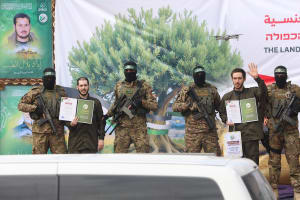Study: Israeli society overlooks grief of over 2,000 bereaved siblings of Oct 7 massacre

Hebrew University studied the 2,185 individuals whose siblings were killed by Hamas terrorists on Oct. 7, 2023 and concluded that the grief of mourning siblings has been largely overlooked by Israeli society.
Hebrew University researcher, Masada Bochris, who conducted the study, said these siblings are suffering but do not receive the same benefits and support as widows, parents and children of the brutal terror attack, because they are considered “just” siblings.
“In the hierarchy of grief, society doesn’t recognize their grief the way they might a widow or an orphan,” she told The Times of Israel. “That doubles and triples their sense of grief.”
Bochris (29), a social worker, lost her brother, Chen Bochris, a deputy commander of the elite Maglan commando unit. Chen was killed while fighting terrorists in Kibbutz Nahal Oz last Oct. 7.
At first, she explained, there were so many people killed that it “took 48 hours to identify his body, so we couldn’t say Kaddish.”
Following her brother’s death, Bochris looked for books that could help her deal with her loss but said she found nothing in Israeli psychological texts. She, then, decided to conduct a study of sibling grief for her master’s degree at Hebrew University.
The study is called: “The Echoes of Mourning: Gender, Birth Order, and Circumstances of Loss in the Events of October 7, 2023.”
In her study, Bochris focused on 444 adults who lost a sibling during the Oct. 7 attack on southern Israeli communities. She concluded that “bereaved siblings are overlooked” by Israel and urged the government to give siblings the same benefits and psychological and health services as bereaved parents, widows, and children.
In addition, she said that social workers and psychologists need training to understand the grief of siblings, as “it will take years to understand” the trauma they experienced as a result of the Oct. 7 atrocities.
Bochris’ study revealed that 20% of the respondents had not been able to work since losing their sibling, with women reporting higher levels of emotional distress than men.
The study also showed that bereaved siblings not only have to deal with the loss itself but also the emotional toll it has taken on their parents, who are focused on their own grief, causing the sibling to put aside their own needs.
Israeli society tells siblings to “go back to work and to live as if we’re not entitled to our grief,” Bochris said.
She also noted that Oct. 7 had led to an “extended trauma,” because of the length of the war, the hostage situation and fears that a similar invasion could happen again.
Bochris also noted the increase in terror rist acts in Israel, citing the recent attacks on the light rail in Tel Aviv-Jaffa, in which seven were killed and 16 wounded; the attack in Hadera, in which one was killed and five wounded; and at the attack at the Beersheva bus station, in which one was killed and 10 wounded. There was yet another terror shooting on Tuesday in which one person was killed and four others wounded, after a terrorist opened fire on Highway 4 near the town of Yavne.
“Our society is exposed to trauma and then exposed to it again on social media, so it’s a double trauma,” she said.
Bochris serves in the IDF military reserves and is in charge of planning special operations in Gaza. She conducted her study while serving in her IDF role and when she was on break from the army.

The All Israel News Staff is a team of journalists in Israel.













